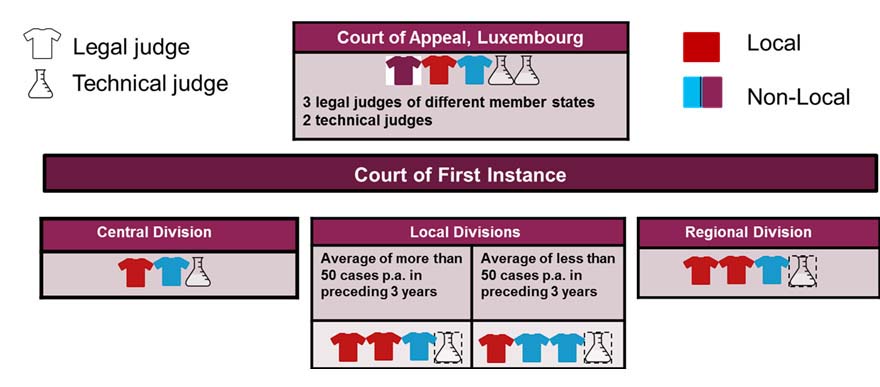Nick Cunningham
Of Counsel
Article
8
The below article is outdated and does not reflect new developments since its publication. You will find up-to-date information about the Unified Patent Court and the Unitary Patent at gowlingwlg.com/upc
The Unified Patent Court (UPC) is the biggest change European patent law has seen for decades and there remain questions regarding how it will operate and what it will mean for patent owners. We address some of the common queries and concerns below.
The UPC will apply to existing and newly granted EPs and UPs. However, during the transitional period (initially a period of seven years):
The UPC will not apply to national patents or to EPs validated in non-participating countries (i.e. Spain, Poland and Croatia and EPC contracting states outside the EU). Such patents will still need to be enforced in the national courts.
The UPC comprises of various 'local divisions' and a Court of Appeal and Registry based in Luxembourg:

The cost of commencing proceedings in the UPC will depend on the nature of the dispute. For certain types of proceedings, including an infringement action, the court fee will depend on the value of the dispute, but will be at least €11,000. For other types of proceedings only a fixed fee will be payable.
The UPC will be a 'loser pays' system where the losing party is responsible for the successful party's costs. However, the amount which the losing party has to contribute will be capped according to the value of the dispute.
The rules on court fees and recoverable costs can be found here and published guidance for determining the value of a case in the UPC can be found here.
Yes. A wide range of provisional and protective measures are available to litigants in the UPC, including:
Applications can be granted on an 'ex parte' basis. However, before deciding whether to grant interim relief, the court will take into account the outcome of any opposition proceedings, the urgency of the case, whether the defendant has been heard, whether any protective letter has been filed and the balance of convenience. Compared to the current approach of the High Court of England and Wales, it seems likely that the UPC will be more willing to grant interim relief.
No, although the UPCA states that parties must be represented by:
Gowling WLG lawyers are therefore free to act in proceedings before any Local or Central Division.
However, we also appreciate the value of working with patent attorneys and/or local lawyers where necessary. This will be particularly important as the court develops its early case law, as national customs and practices may persist in certain Local Divisions. We have a network of trusted local advisors and patent attorneys to ensure clients are able to build a team tailored to the location of the proceedings and the technology in issue.
For further information on the UPC or advice and guidance as to how to prepare for it coming into force in 2017, please speak to Nick Cunningham, Michael Carter or another member of our patent team.
NOT LEGAL ADVICE. Information made available on this website in any form is for information purposes only. It is not, and should not be taken as, legal advice. You should not rely on, or take or fail to take any action based upon this information. Never disregard professional legal advice or delay in seeking legal advice because of something you have read on this website. Gowling WLG professionals will be pleased to discuss resolutions to specific legal concerns you may have.